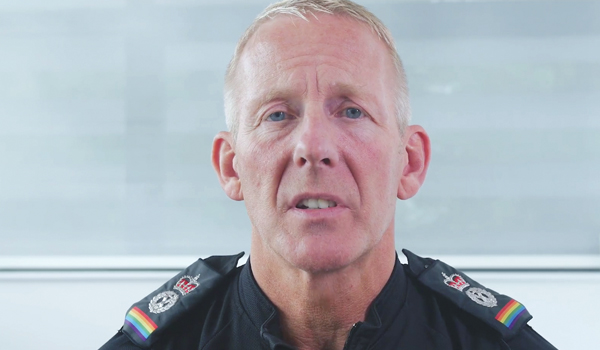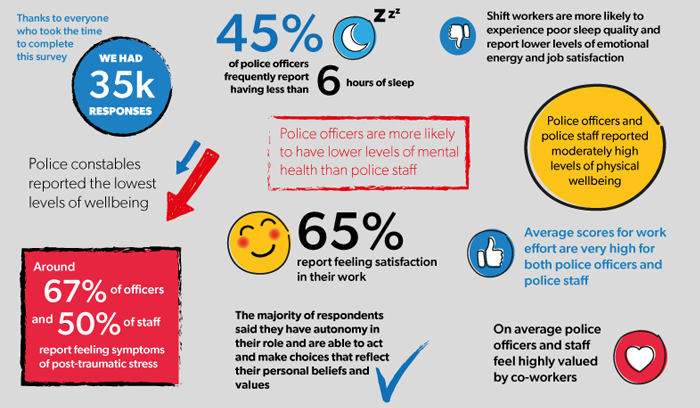Officer and staff fatigue ‘a priority’ following first-ever national policing wellbeing survey
Research into ways of tackling fatigue among police officers and staff is to be made a priority after almost half of officers admitted they were getting less than six hours sleep a night.
It follows the results of the first-ever national police wellbeing survey in which more than 34,000 police officers and staff across England and Wales responded.
Both the Oscar Kilo National Police Wellbeing Service and the College of Policing have now committed to prioritise the “health, wellbeing and resilience of officers and staff”.
Research will be conducted with experts in police fatigue from around the world, together with UK practitioners and staff associations, to look at ways to reduce the growing issue of officer and staff fatigue.
Chief Constable Andy Rhodes, National Police Chiefs’ Council (NPCC) wellbeing lead and service director for the National Police Wellbeing Service, said “fatigue leaps off the page” in the survey.
“This has a lot to do with our cultural acceptance in relation to things like disrupted sleep and all the risks it can bring to our health and operational decision making,” he said.
“On this specifically, the Oscar Kilo National Police Wellbeing Service team are already linking in with staff associations, wellbeing leads across the UK and experts from around the world to establish a specific area of work on fatigue as part of the national programme to ensure we address this.
“One of the other key things evident from the findings, is that officers and staff tend to start on day one, new into the organisation, full of energy, but very quickly start to dip on almost all areas of wellbeing surveyed.
“Do we just shrug our shoulders and accept this as ‘how it is’ or do we refuse to accept it has to be so? We believe we can do more to maintain and even increase wellbeing from day one throughout our careers and the survey findings will help us make the point.”
Mr Rhodes said the fact that almost 35,000 people responded to the first ever national survey on wellbeing was in itself “a big positive”.
“Looking at the results, we see some areas of progress, and other issues which strengthen our resolve to keep doing more,” he added.
“It’s clear that many people feel valued by their peers and supervisors – but less so by the organisation and the public – a gap we see in every survey that is directly linked to trust.”
The survey found shift workers were more likely to experience poor sleep quality, while police officers working in safeguarding and investigations reported lower levels of wellbeing. Among police staff, those working in areas such as custody, contact management and incident management reported lower levels of wellbeing.
There were, however, many positive findings from the survey, which ran for eight weeks between November 2019 and January 2020:
- Sixty five per cent of respondents reporting feeling satisfaction in their work;
- The majority of officers and staff reported they felt trusted in their roles and were able to act and make choices which reflected their own personal beliefs and values; and
- Both police officers and staff reported feeling high levels of competence in their work, meaning they felt they could be effective, make important contributions and felt valued by their co-workers and supervisors.
Chief Constable Mike Cunningham, chief executive officer of the College of Policing, which governs the National Police Wellbeing Service, said: “The police workforce remain our greatest asset so it is vital we continue to support and enhance the health, wellbeing and resilience of officers and staff so they are best equipped to keep the public safe.
“This survey has now provided a baseline, which the National Police Wellbeing Service will use to measure future progress, which will help to prioritise work at both a national level and in the support we provide to individual forces.
“The expectation now is that forces will also address the key themes identified in the survey as part of their local approach to wellbeing with the support of Oscar Kilo where needed.
“We will look to conduct the survey again the end of this year and then again in 2021 to assess progress and whether improvements are being achieved.”
The survey was carried out prior to the onset of the coronavirus pandemic, which the National Police Wellbeing Service said has brought “new challenges on a daily basis” and puts the wellbeing and welfare of staff to the fore in a completely different way.
It added: “Some of these challenges of course may not be represented in this survey and we are working with the NPCC and College of Policing to support the wellbeing response to Covid-19 and with forces around the country to ensure that we capture information around this more specifically as we move forward.”



